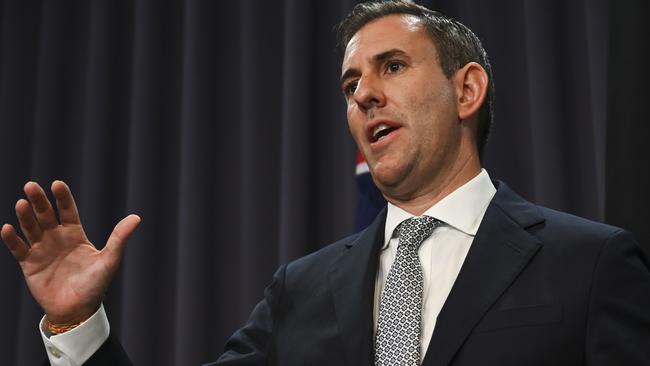Chalmers flags new budget era as tax bonanza fades
The Treasurer has declared an end to the historic post-Covid tax bonanza, as he prepares for a pro-growth May budget that will still deliver another round of cost of living support.

Jim Chalmers has declared an end to the historic post-Covid tax bonanza that delivered Labor’s first two budgets $200bn in revenue upgrades, as the Treasurer prepares for a pro-growth May budget that will also deliver more cost-of-living support for struggling households.
In a major speech to the Committee for Economic Development of Australia on Thursday, the Treasurer will flag that commodity prices, and in particular iron ore, are running ahead of Treasury’s conservative assumptions, but not nearly as far ahead as in previous budgets.
Dr Chalmers will also frame the May budget within the three challenges of “global uncertainty, persistent cost-of-living pressures, and slowing growth”.
National accounts figures released last week reveal the economy slowed to a crawl at the end of 2023, dragging growth to 1.5 per cent through the year and to the weakest in two decades, outside the pandemic.
Inflation has trended firmly lower, but at 4.1 per cent in December it still remains too high.
Meanwhile, major nations such as Britain and Japan have slumped into recession, highlighting the fragile state of the global economy.
“These pressures necessitate an approach to the third budget which is a little bit different, but not a lot different, to the first two,” Dr Chalmers will say. “There will still be a premium on what’s responsible, affordable, meaningful and methodical. There will still be a primary focus, but not a sole focus, on inflation.”
As the profits of miners begin to fade, so too will the booming tax receipts that have helped inflate commonwealth coffers.
The December mid-year economic and fiscal outlook predicted a slim $1.1bn deficit for this financial year, and Dr Chalmers has made it clear he still expects to be able to deliver a second consecutive surplus in May despite the waning tailwinds from softer commodity prices and a cooler jobs market.
Economists at CBA estimate the Albanese government is on track to report a substantial $20bn surplus for 2023-24, or similar to the previous year’s $22.1bn.
Dr Chalmers on Thursday will confirm “we are still shooting for a second surplus”, but will qualify the good news with some changes.
“The revenue upgrades will be smaller. In each of our first two budgets we benefited from more than $100bn in revenue upgrades. This year, we won’t see anything like that,” he will say. “In fact we are even looking at much less than the $69bn we booked in the latest mid-year budget update.”
The warnings come as reports emerge that Labor ministers have become increasingly frustrated that their spending proposals are being rejected by the powerful expenditure review committee.
Dr Chalmers will highlight the recent drop in the price for our major export, iron ore, which recently dipped below $US100 a tonne as traders responded to fears of slowing Chinese steel demand and leaving it “around 20 per cent lower than it was this far out from last year’s budget”.
Similarly, thermal coal – used in power generation – has “been more or less tracking along the path Treasury assumed in December, no better or worse … but its current price is about a third lower than it was this time last year,” Dr Chalmers will say.
As the commodity price budget tailwind fades, the Treasurer says income tax receipts are more likely to track, rather than beat, budget forecasts, as the huge jobs growth that followed the end of Covid lockdowns has also slowed.
“While the labour market is still pretty resilient, it’s now softening, so we won’t get the very substantial revenue upgrades we’ve seen from outperforming expectations here,” the Treasurer will say.
Dr Chalmers this week said his third budget on May 14 would have “a primary focus on inflation but not a sole focus on inflation”.
The government would retain “a premium on what is responsible and affordable … but we can’t ignore the fact that some of these growth drivers have become more problematic, and we saw that in the December quarter”, he told a business conference.
“You’ll certainly see measures for the longer term on growth and that will be a very big priority.”




To join the conversation, please log in. Don't have an account? Register
Join the conversation, you are commenting as Logout